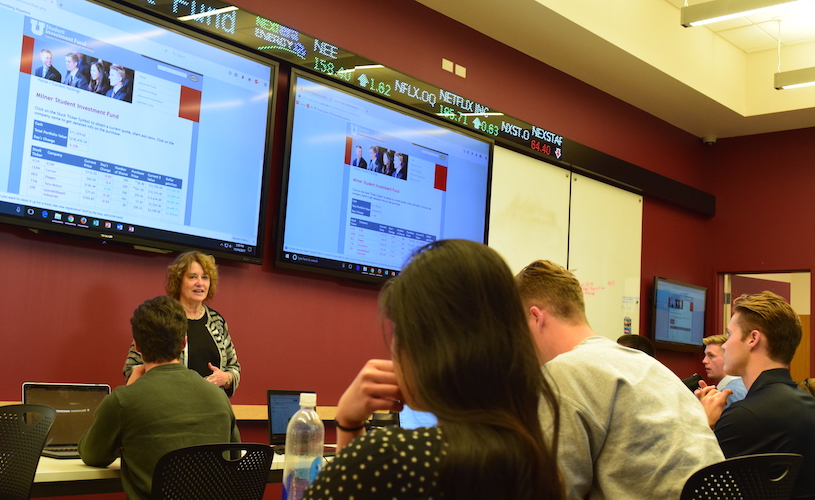at the University of Utah
Eccles School’s Student Investment Fund hits $1 million mark
The Student Investment Fund at the David Eccles School of Business hit the $1 million mark on Aug. 5, 2020.
“I am really excited to reach the $1 million threshold,” said Elizabeth Tashjian, a professor of Finance and faculty advisor of the Student Investment Fund. “Although it is an arbitrary number, it says to our students, our alumni, and employers that the students have serious responsibility for a meaningful portfolio.”
In its more than 20 years, the fund has beaten the SPDR S&P 500 ETF (ticker SPY) for its entire run (SPY had an annual return including dividends of 6.7% while SIF had a return of 7.4%, even after taking into account all the expenses, taxes, etc.)
“If you had invested $1,000 if SIF at the beginning, you would have earned almost an extra $650 relative to investing in the index,” Tashjian said. “Most active funds underperform the index after accounting for costs, so we are very proud of our performance.”
The Student Investment Fund got its start when a group of finance undergraduates at the David Eccles School of Business formed a club to start a student-managed investment fund in the fall of 1998. In January 1999, D.A. Davidson selected the club to be part of its Student Investment Program, which allowed schools to invest in a $50,000 portfolio. Each August, the portfolio was reset to $50,000 with losses replenished by D.A. Davidson, and 50% of gains above 5% was donated to the school. The donations were invested in a separate account and included donations from others such as Bill Child and Hal Milner. Students have sole discretion over the investments made and must manage the risk of their investments.
“I provide academic content, but the students make all their own investment decisions,” Tashjian said. “Sole discretion over investment decisions heightens the students’ sense of ownership and responsibility for investment outcomes.”
That sense of ownership has proven invaluable to Andrew Tuitele, a senior in Finance who participated in the Student Investment Fund during the Fall Semester of 2019 and Spring Semester of 2020.
“The University of Utah SIF is unique when compared to other student-run investment funds in that it is completely managed by students,” Tuitele said. “Many other investment funds, because they use endowment money, are required to abide by very restrictive investment policies. Since the SIF invests independently raised money, the students have complete control over their investment decisions.”
That autonomy has taught Tuitele about the importance of tolerating risk.
“In SIF, unlike other classes, we are using real money and our victories and shortcomings have long-term consequences on the state of the class and the fund. Despite this, it is important that we trust our investment thesis and not shy away from the pressure of the situation,” Tuitele said. “I have used this mindset in my own life to be willing to take opportunities and risks that I think are important.”
The Student Investment Fund is a year-long undergraduate honors class focused on fundamental analysis, and does it in the signature experiential learning manner the Eccles School has grown to be known for across many majors. Students spend time pulling apart companies, trying to understand how they make money, and projecting their future performance. Students must understand how everything from macroeconomic and industry factors affect a company to the impact of the company’s strategic plans, competitive positioning, pricing policies, corporate culture, and supply chain on corporate value. The curriculum is demanding, and students do a huge amount of writing and make many presentations.
“Irrespective of students’ career paths, a broad understanding of corporate value drivers and business communication are immensely valuable,” Tashjian said. “And, it is a lot of fun when we make money, too. Employers recognize these skills and SIF students place very well.”
That’s true for Tuitele, who will work for Bank of America Merrill Lynch’s Investment Bank in the Bay Area as an analyst after graduation.
“SIF provided me with a very strong skill set that I will use for the rest of my career,” Tuitele said. “I highly recommend SIF for any student who is interested in finance and markets.”





